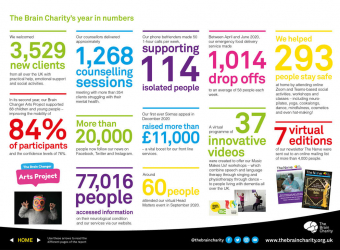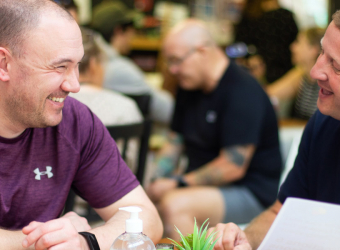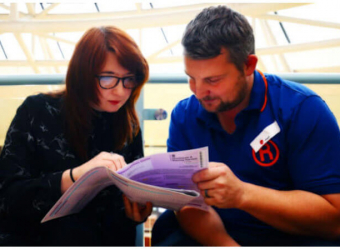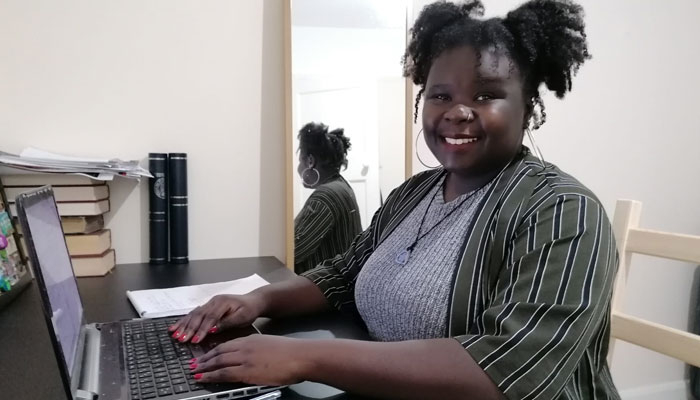
A day in the life of The Brain Charity’s Information and Advice Officers
Our staff member kept a log of her day to give an insight into the specialist support we provide
The Brain Charity’s helpline is open from 9am until 4.30pm Monday to Friday, and is staffed by four of The Brain Charity’s Information & Advice Officers.
The rota changes each week, and this week it was staff member Vanessa’s turn to be available manning the phone.
As The Brain Charity is an umbrella charity for people with all forms of neurological condition – and there are more than 600 in total – calls and requests for help can be very varied.
For this guest blog, Vanessa kept a log of her day’s activities to give an insight into some of the specialist guidance The Brain Charity provides.
9:00am – Helping a friend to get a specialist in neurology for cluster headaches
The first call of the day came from someone who wanted information for their friend who suffered from cluster headaches. Their friend was extremely grateful for the information we had available on our website regarding applying for Personal Independence Payment (PIP) while suffering from cluster headaches. However, the person in question was struggling to get a specialist in Neurology since moving to a different part of the country. This meant the medical evidence they could show while applying for PIP was limited. The caller’s friend wanted to know of private neurology clinics in their area.
I went away and investigated potential options, but advised the caller I was unable to give a professional opinion on which of the options available was best due to being non-clinical. The caller was delighted we could help locate local private clinics. I also gave them details of another organisation called OUCH – Organisation for the Understanding of Cluster Headache, which was located in their local area.
9:30am – Mental health and advocacy for someone suffering from migraines
The next caller on the helpline was concerned as a family member had been suffering with migraines for more than a decade. They claimed the patient’s GP was not taking it seriously and had refused to make a referral to a specialist. The migraines were taking a toll on the family member’s mental health and felt as though they weren’t getting the support they needed.
I made a referral for the patient to receive counselling at The Brain Charity to try and manage their mental health, and learn how to cope with their condition. This counselling was also offered for free to the caller who showed great concern for their family member’s wellbeing. Having a neurological condition not only affects the person suffering, but anyone that cares for them and loves them too. That’s why it’s vitally important we at The Brain Charity offer these services to the family members, friends and carers of the person affected as well.
I also signposted the caller to our Carers Advocacy service, who can help get her voice heard when liaising with the family member’s GP. This took the pressure off the caller, and also supported them to understand their rights and options in this situation.
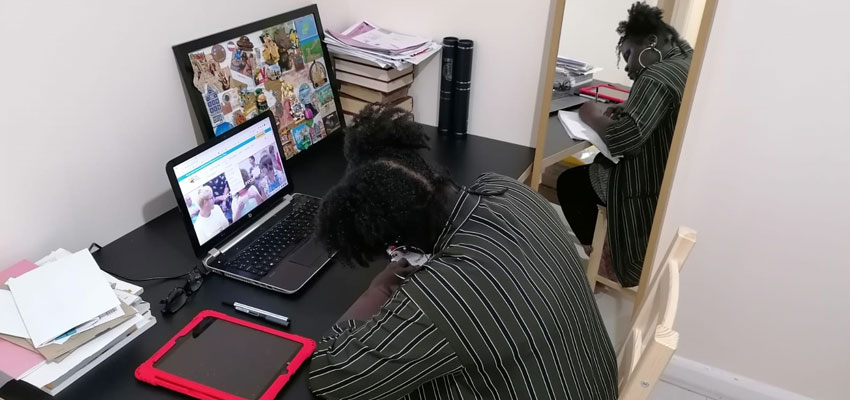
10am – Welfare benefits support
My third caller of the morning wanted some Welfare Benefits support and was referred to The Brain Charity from The Walton Centre. I discussed with the caller what benefits they may be entitled to, how to apply for the relevant benefits, and what support I could offer the caller in applying for these benefits. I arranged a call back for a later date to discuss this in more depth, and support the caller to apply for their welfare benefits.
10:45am – Support filling out a PIP form with Multiple Sclerosis (MS)
One of my existing clients got in touch to tell me they were posting their a PIP form to me so I could support them with filling this in. PIP is a type of benefit given to people by the government to help with extra costs if they have a long-term illness or disability. Unfortunately, many of our service users are initially turned down for PIP as neurological conditions are invisible, and have to fight to get this overturned – often with our help. Due to their condition, they struggle with fatigue, concentration, memory, pain, weakness in their limbs and numbness in their hands – making writing a PIP form an impossible task. I also discussed with the client what medical evidence to include. As this was quite overwhelming for them, I accepted all the available medical evidence, and sifted through to find those that really expressed how their condition affected them so I could include the most compelling evidence to support their PIP claim.
11:00am – Christmas cards
The next caller wanted to know how to order some of The Brain Charity’s Christmas cards. I told them how to order from our website, and gave them the number to call to order through reception. They decided to give reception a call.
11:10am – Sifting through medical evidence for disability benefits support
During a rare quiet spell on the phones, I began looking through medical evidence for someone living with a central nervous system (CNS) disorder, Lupus, and Stage 4 Kidney Failure who needed to apply for PIP. Due to the nature of their conditions, the person had provided an extremely large pile of medical evidence to go through. I pulled out the most relevant information in support of their claim. Reading the information also gave me a much better understanding of their treatments, medications, and medical history.
12:00pm – Mental health deterioration and social isolation due to government lockdown
I respond to an enquiry from someone whose family member has an acquired brain injury which occurred several years ago. ABI can increase the risk of mental health conditions such as depression and anxiety. The family member is concerned about their family member’s mental health due to the current Covid-19 lockdown and the social isolation is has caused. I tell them about The Brain Charity’s free counselling, telephone befriending service and social activities, all of which the relative could get with to help combat their mental health issues at this difficult time. I will continue to liaise with the person’s family, and social worker to ensure they get access to all the support available.
12:30pm – What happens when I reach state pension age?
The next caller to the helpline was feeling worried about how their finances would change once they reached state pension age. They are currently claiming PIP, ESA, a private pension and a warm homes discount, while another person caring for them is claiming Carer’s Allowance. I advised the caller about how their welfare benefits may change once they reach state pension age, and what to do next. I also discussed how to further maximise their income by applying for a council tax reduction on the grounds of a disability. The caller felt relieved to know support was available and they wouldn’t be abandoned once they reached the age of retirement.
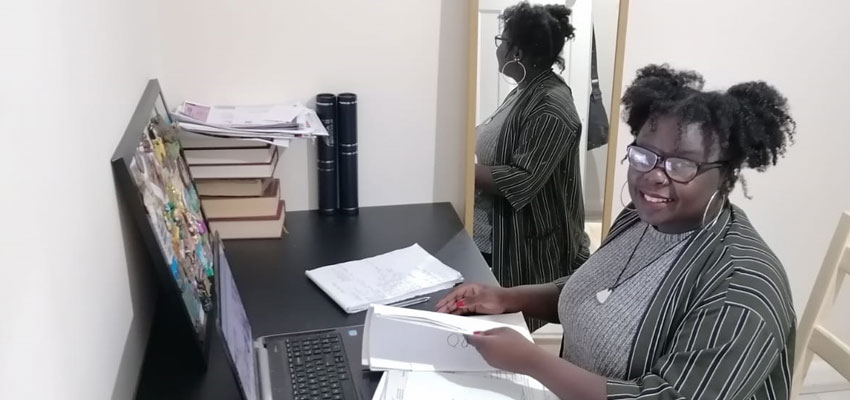
1:15pm – Is counselling still running during the current government lockdown?
This caller wanted to know if our counselling service was still running during the lockdown. I was pleased to tell them The Brain Charity is currently offering counselling via telephone, video call, and face-to-face in a covid-safe environment. In-person counselling is still available due to it being a vital therapy and therefore excluded from lockdown regulations. The person wanted to self-refer to our counselling service, so I logged details for the counselling coordinator to add them to the waiting list and book an appointment.
1:30pm – Moved from Disability Living Allowance to Personal Independence Payment
The next caller had recently moved from Disability Living Allowance, an older form of disability benefit, to PIP. This caused a decrease in how much money they were awarded. Previously, DLA was based on the person’s diagnosis and condition, however PIP is based on how their condition affects them. The criteria to be awarded PIP is also different from DLA. The caller wanted to do a Mandatory Reconsideration for the decision, which is where you challenge it with the Department of Work and Pensions. I asked the caller to send me the DLA award information, PIP award information, the decision letter, and anything else that would help me write an appeal letter to the Department of Work and Pensions. Another appointment was scheduled to discuss the documents further at a later date. If this reconsideration is unsuccessful, the next option is to take the decision to a tribunal.
2:15pm – Welfare benefits tribunal
A service user had been notified their request to appeal their Welfare Benefits decision at tribunal had been accepted. They therefore needed to prepare information for the court to submit before the tribunal date. I began writing the submission to court with the person via the telephone. I had previously supported this caller through their entire benefits application process; from collating medical evidence to preparing them for their health assessment, submitting a mandatory reconsideration, and finally requesting to appeal the decision.
3:30pm – Acquired brain injury at work
This caller sustained a brain injury at work last year and is struggling medically as a result of it. Their GP advised they were not qualified to explain the results of their recent CT scan, so I encouraged them to ask their doctor for a second medical opinion on the CT scan to get answers.
The caller’s mental health was also suffering due to being unwell, struggling with their GP and battling with their previous employer. I offered to refer them to our counselling team to help them to deal with what they were going through. The Brain Charity also offers legal advice – this client already had a solicitor in place, so I advised them what to ask the solicitor to get further support.
4:30pm – Risk of losing job
My last call of the day came from an Occupational Therapy community stroke team, who called for support for someone in their care who was recovering from a stroke and trying to get back to work. Their employer unfortunately hadn’t offered them the same role they had been doing before the stroke.
I advised the caller of the person’s employment rights, how they could ask their employer for reasonable adjustments, and how to combat workplace discrimination if this occurred. I arranged a time to call the person direct to discuss this further.
Categories: Advice, Guest blogs
Published: 18 March 2021




